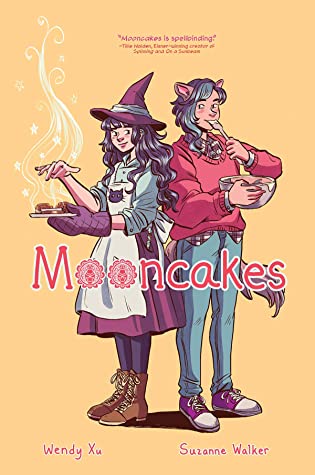- The Good: A warm-hearted tale with lots of representation
- The Bad: A severe lack of stakes that undercuts the story’s momentum
- The Literary: Okay, maybe this isn’t entirely literary, but there’s a great character who’s a man with the head of a pigeon!
Nova Huang is a witch in a family of witches. Her parents are no longer alive, so she lives with and works in the magic shop of her two grandmothers, who give her a happy and loving home. She’s ecstatic when her childhood crush Tam Lang, a non-binary werewolf, comes back into her life, but Tam brings danger and pursuit in their wake. Someone or something is after them, and the rekindled fires of teenage romance might be snuffed out if dark forces are allowed to prevail.
Mooncakes is very much like a lesser episode of Buffy or Sabrina the Teenage Witch, with good-hearted but magical suburban teenagers squaring off against the supernatural villain of the week—a villain whose only real purpose is to provide shape to the story while the real focus is on the personal lives of the protagonists.
The main thing that sets Mooncakes apart from those 90s classics is an added dose of progressive representation and acceptance. From the non-binary Tam, to the why-label-it romance between the teens, to the as-far-as-I-can-tell-they’re-a-gay-couple relationship between the grandmothers, no one’s identity is ever judged or ostracized or even commented upon. And that’s kind of nice. Perhaps not so realistic, unfortunately, but nice.
But that niceness is simultaneously where Mooncakes fails the most because the story has a major lack of stakes. Nova’s grandmothers and friends are always there to protect her, fight the baddies, assure her she’s loved and accepted, and generally take care of any problems that arise. The result is that the story doesn’t feel like it has any momentum, and, more importantly, that Nova reads as extremely sheltered, which is its own kind of privilege and eats into the progressive messaging of the book. It’s easy to have ideals when you want for nothing (or as the film Parasite puts it brilliantly, “She’s nice because she’s rich.”).
Not a bad book by any stretch, but one that’s very familiar, and whose progressivism is counterbalanced by its slight lack of self-awareness. Recommended for anyone looking for a nice but unchallenging read.
